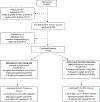Randomized controlled trial of motivational interviewing for alcohol and cannabis use within a predominantly Hispanic adolescent sample
- PMID: 33749294
- PMCID: PMC9113520
- DOI: 10.1037/pha0000445
Randomized controlled trial of motivational interviewing for alcohol and cannabis use within a predominantly Hispanic adolescent sample
Abstract
Hispanic youth represent one of the fastest-growing minority groups. Yet, we know little about Hispanic adolescents' response to empirically-supported interventions for adolescent addiction, including motivational interviewing (MI). This randomized controlled trial (RCT) compared MI to an active educational treatment for adolescent alcohol and cannabis use (alcohol and cannabis education; ACE). Adolescents who regularly use substances (N = 448; n = 347 Hispanic; n = 101 non-Hispanic white; ages 13-18) were randomized to two 1-hr individual sessions of MI or ACE. We examined 6-month outcomes and mechanisms of change across Hispanic and non-Hispanic white youth. Treatment response was comparable across ethnicities (Hispanic vs. non-Hispanic white youth). Additionally, adolescents in the MI condition showed greater reductions in alcohol use compared to those in ACE, with support for motivation and self-efficacy as mechanisms of treatment response. Direct effects of MI on cannabis use were not observed; however, a significant indirect effect of motivation was observed for reductions in cannabis use. Data support the efficacy of MI in reducing adolescent alcohol use, through the vehicle of enhanced motivation and self-efficacy. While consistent treatment response was observed for adolescent alcohol use across ethnicities (Hispanic vs. non-Hispanic white), further exploration into potential underexplored mechanisms of Hispanic adolescents' treatment response is requisite to strengthening prevention and intervention programming for Hispanic adolescents' cannabis use. (PsycInfo Database Record (c) 2022 APA, all rights reserved).
Trial registration: ClinicalTrials.gov NCT01948700.
Conflict of interest statement
Figures



References
-
- Arroyo JA, Miller WR, & Tonigan JS (2003). The influence of Hispanic ethnicity on long-term outcome in three alcohol-treatment modalities. Journal of Studies on Alcohol, 64(1), 98–104. - PubMed
-
- Austin A, Hospital M, Wagner EF, & Morris SL (2010). Motivation for reducing substance use among minority adolescents: Targets for intervention. Journal of Substance Abuse Treatment, 39, 399–407. - PubMed
-
- Babor TF, Higgins-Biddle JC, Saunders JB, & Monteiro MG (2001). The Alcohol Use Disorders Identification Test: Guidelines for Use in Primary Care (2 ed.). World Health Organization.
Publication types
MeSH terms
Substances
Associated data
Grants and funding
LinkOut - more resources
Full Text Sources
Other Literature Sources
Medical
Miscellaneous

